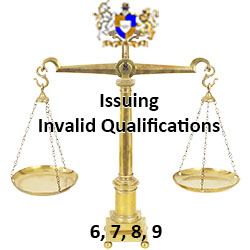Issuing Invalid Qualifications
 Although the global coaching and mentoring industry is legally unregulated, meaning that anyone can call themselves a coach or a mentor (or both), regardless of their professional background, qualifications, and competencies.
Although the global coaching and mentoring industry is legally unregulated, meaning that anyone can call themselves a coach or a mentor (or both), regardless of their professional background, qualifications, and competencies.
To address this issue, the industry has found a solution in self-regulation; and the International Regulator of Coaching and Mentoring CIC (IRCM CIC) is a UK government-approved Regulator for the protection of the consumers. The IRCM CIC works closely with a number of Professional Bodies who have set independent professional and ethical standards for coaches, mentors, and private commercial training providers.
Although self-regulation can be seen as a big step forward in becoming more professional as an industry, it still doesn’t solve all the industry problems: as seen through the Requests for Facilitation and Formal Complaints lodged with the Ombudsman Service. Not every person or business within the coaching and mentoring industry agrees to comply with the minimal Unified International Codes of Conduct.
This Formal Complaint highlights the challenges of Coaching and Mentoring Organisations that have been set up to supply coaches and/or mentors to consumers, without fully understanding or agreeing to comply with the self-regulation unified international industry codes of conduct – ethics, standards, and competencies.
As the Ombudsman Service received no appeals from Complainant or either Respondent; the Head of Ombudsman Service concluded that the report, sanctions, and recommendations have been accepted.
Neither Respondent #1, nor Respondent #2, nor either Third Party have met the Recommendation or Sanction requirements, and as such these will be retained on the Ombudsman Service Register until they do. Should further grievances, disputes, and/or complaints be registered with the Ombudsman Service against Respondent #1 or Respondent #2 or involving either Third Party; this complaint will be incorporated into the review.
.
The Ombudsman Service has not received any applications for these actions, recommendations, and sanctions to be lifted. Should applications be received to lift these actions, recommendations, and sanctions, this Case Study will be updated.
Dated: 21st September 2020
Ombudsman Service
International Regulator of Coaching and Mentoring (CIC)
27 Old Gloucester Street, London, WC1N 3AX, United Kingdom
.
Notes:
- The definitions for industry-standard terminology can be found on the IRCM CIC’s Coaching and Mentoring industry recognised Definitions.
.
.
Currently, all information provided by and correspondence with the IRCM CIC is in English.
